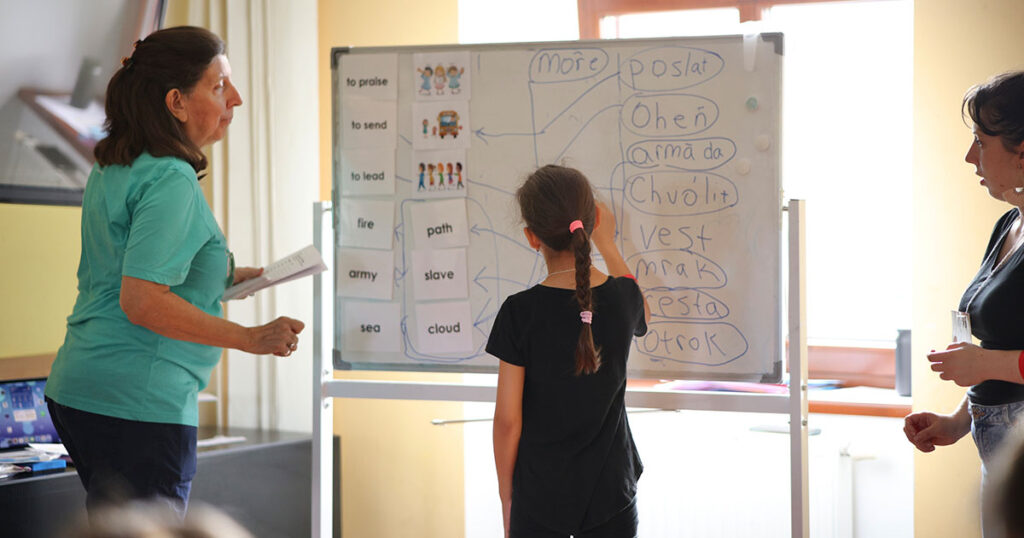
LCMS short-term mission volunteer Chris Leistico, left, works with a student who is matching Czech words to the corresponding English word during an English Bible Camp in the Czech Republic in July 2023. (Photo courtesy of Mark Winterstein.)
Story 2 of 6 — Spring 2024
The Lutheran Church—Missouri Synod’s Office of International Mission has compiled a series of six commentaries about the experiences of short-term mission volunteers who served during an English Bible Camp in the Czech Republic in July 2023. The second commentary is below, and all of the stories are available in the series archives.
Crystal Potts, LCMS Short-term Mission Volunteer
As I write this, I sit in a lovely room in an area of our retreat center in Hradek. My hosts — one from America (who speaks excellent Czech) and one from the Czech Republic (who speaks excellent English) — are both in the kitchen of our center, conversing with the property managers about what needs to be done as we prepare to check out (no pun intended).
I will help when called upon, but until then, I sit to the side, waiting for direction since all that is being said is, for lack of a better term, Greek to me. We are here to serve. We are here to learn. We are here to … be humbled?
Learning a language is hard work
The prior day, LCMS missionary Ben Helge instructed our group at volunteer orientation in the Czech Republic on the morning of July 7, 2023, for 20 minutes — with zero English allowed. Y’all, I’m not going to sugarcoat this. It was brutal. Ten words, you guys, that’s all we were asked to learn. The children who attend our English Bible Camps in the Czech Republic knowingly commit to this challenge to an exponential degree for the entire week of their attendance.
Our group of American teens and adults were mentally exhausted after 20 minutes and 10 words — we can only imagine the fear, fatigue and frustration that a child might experience after a full day and countless new words and concepts. The bravery and fortitude required to put yourself in the position to learn a new language and engage with a new culture beyond the safety net of books or the internet (we see you, Duolingo) is no small thing.
Chelsea Irwin, another of our full-time missionaries, shared a story from one of last year’s English Bible Camps in Poland where, just a few minutes into the lesson, two small girls burst into tears. As it turns out, not only were they confused by the amount and speed of English being spoken, but they were also Ukrainian refugees — so the Polish interpreter, who theoretically would have bridged any gaps, was of little comfort. (Don’t worry, a Ukrainian interpreter was found straightaway, the little girls were given a snack and a clear explanation and were happy and giggling in no time.)
Guidance for cross-cultural communication
Luckily for the American International English Bible Camp volunteer, an interpreter in our native tongue is almost always available. For the English speaker in a situation where communication is dependent on an interpreter, we are taught that the main things to remember are as follows:
- Speak slowly (but normally) and to the intended recipient of your message. Loud and staccato do not equal helpful.
- If you are going to read something aloud to your audience and you already have it written down, share it with your interpreter in advance so that any confusion can be worked out ahead of time. We want to avoid having the interpreter learn something at the same time as they are translating when at all possible.
- Now is not the time for flowery, overly expressive language. Simple is best. Impress us all with your extensive vocabulary some other time.
These concepts would seem to be common sense, but we can easily lose sight of them in a hurry to deliver a message or complete a transaction. These rules were good reminders for all of us in dealing with one another as well as with those we are here to serve.
We are indeed here to serve as well as to learn, and both of these things require a level of humility and self-awareness of our inherent inclination to grow frustrated or disheartened when knowledge or understanding doesn’t come easily. We are, along with our understanding of the English language, freely handed the keys to opportunity that so many are forced to labor for a lifetime to unlock.
In the same way that we are freely given salvation, we are likewise given these “keys to the kingdom” in terms of worldwide access to knowledge and, therefore, opportunity, simply by knowing how to speak English. We don’t have to work for it.
This cannot be said for all people. For many, it is an arduous, frustrating journey to understanding. We Americans felt the strain of 20 minutes of mandatory foreign language, and, put simply, it was just plain hard. We suddenly encountered a locked door and did not possess the key.
The bottom line is this — the children and adults served by the English Bible Camps in the Czech Republic are ready to do the work required to access the “kingdom,” if you will. We are gatekeepers, in a sense, to this kingdom, and our service in the Czech Republic can help ensure that these “gates” are not closed to those who seek entry.
Consider joining us next year to experience this challenge for yourself and help the people of the Czech Republic unlock the freedom of Christ. Visit servenow.lcms.org/short-term to find out how.